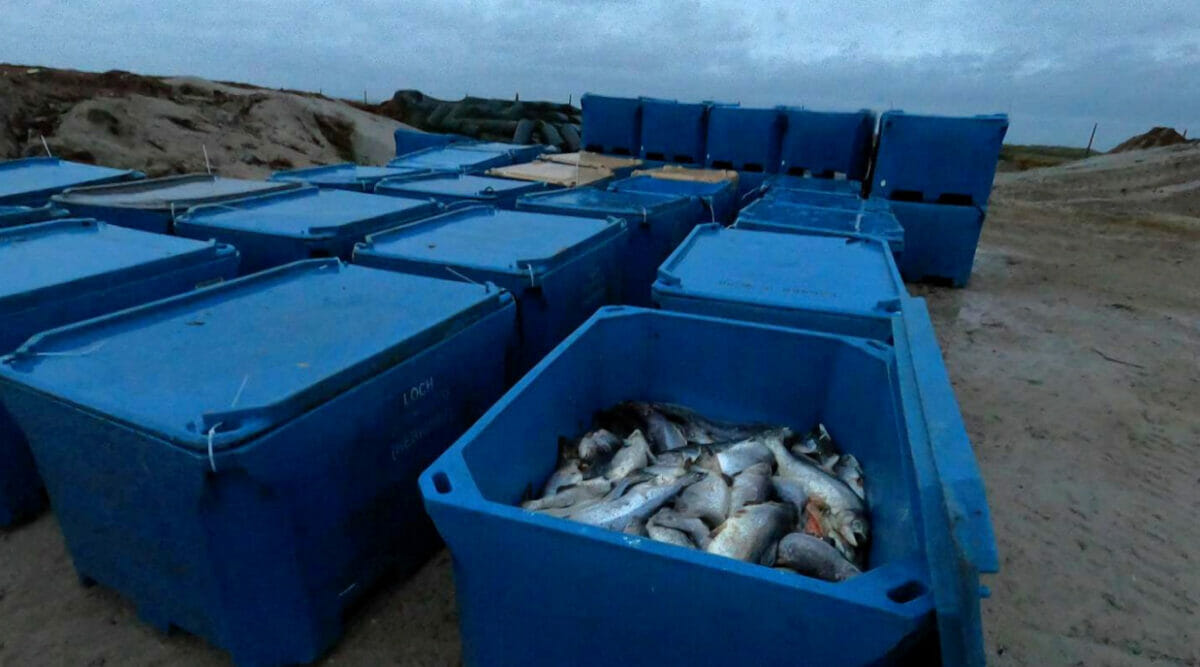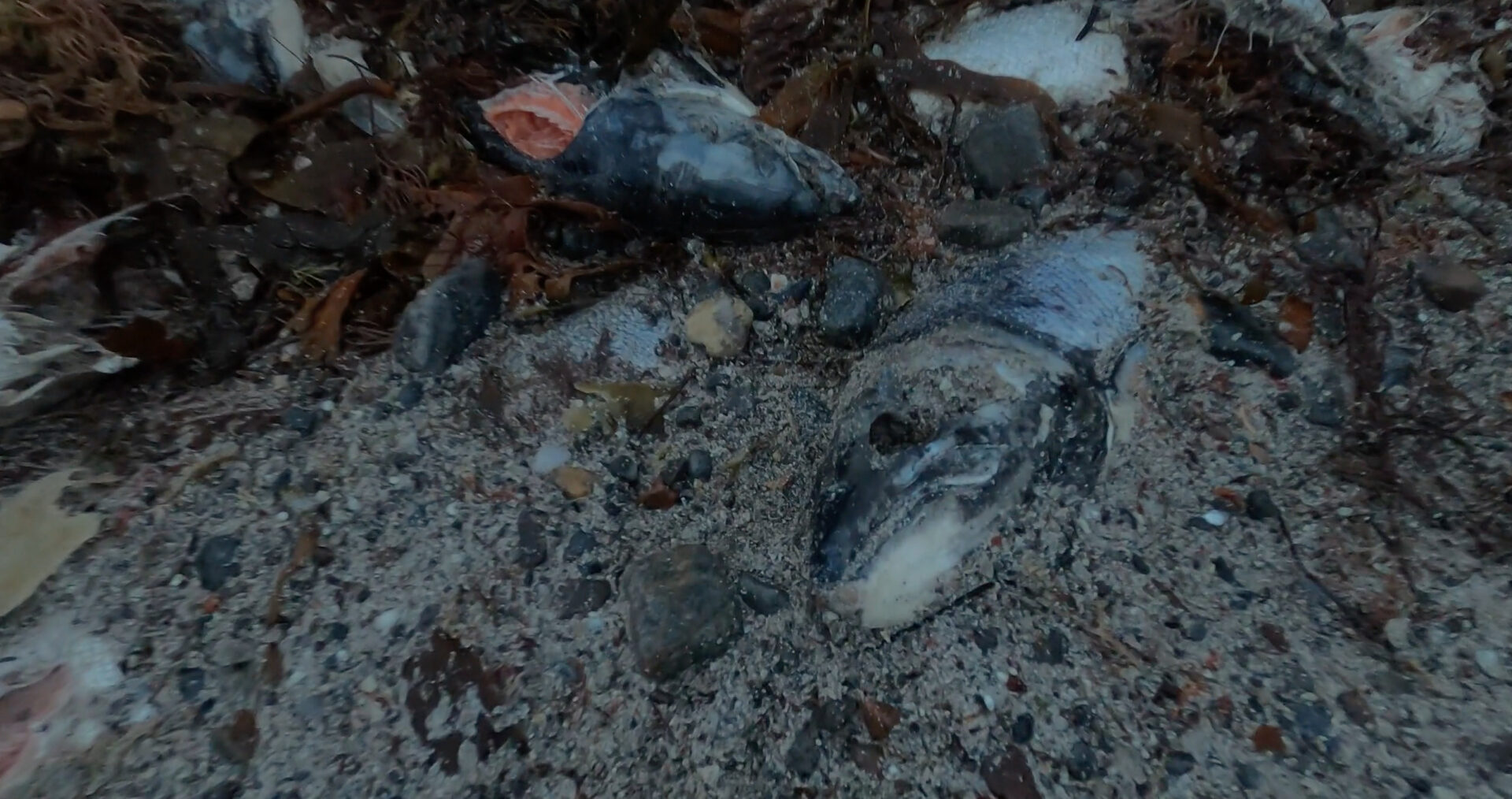The “illegal” dumping of dead farmed fish in sand dunes on a Hebridean beauty spot has been allowed to continue despite authorities’ plans to ban the practice in March 2022, The Ferret can reveal.
The burial pits at the Whiteshore Cockles landfill on North Uist have remained open more than nine months after the previous deadline given by authorities, with the stench of dead fish continuing to attract complaints from locals.
While the landfilling of dead fish is illegal on environmental grounds, the Scottish Government’s 2016 temporary exemption order has allowed the dumping to continue until an alternative means of disposal at the site is established.
We reported in January 2022 that the government’s exemption order was set to be revoked by 31 March, with dead fish to instead be processed by a drying plant built with £604,000 of public funding.
Locals and campaigners first raised concerns about the landfill in 2005. Campaign group Scamon Scotland claimed the dead fish dump was “making life a misery for locals” and said it “beggars belief” that it remains open.
The Scottish Greens said the issue had “gone on for too long” and vowed to press authorities to find a resolution.
Whiteshore Cockles told The Ferret that a pollution prevention control (PPC) permit for its drying plant was “being drafted” by the Scottish Environment Protection Agency (Sepa) and should be awarded “imminently.” The company was operating “legally within the guidelines” set by authorities, it stressed.
Sepa confirmed that the company had submitted a PPC application on 24 March 2022, but was not yet satisfied that the plant would “operate within relevant environmental quality standards”.
Communications obtained under freedom of information law by Scamon Scotland show that authorities warned that dumping dead fish at the site ”could cause a major environmental problem”.
Risk of ‘major environmental problem’
In 2021, the firm was given strict new rules to follow by authorities while its dead fish pits remained open, but Western Isles Council claimed some rules were not enforceable.
The council acknowledged that the stench was widespread and “causing significant impact on the neighbouring area”. The pits were not adequately covered or complying with official disposal plans.
A high number of “incidents” at local fish farms had led to masses of dead fish to be disposed of, with “no restrictions on the quantities” of dead fish Whiteshore Cockles could accept, they said. The Ferret found that the firm accepted dead fish from 16 salmon farms in 2020.
As the firm could not “effectively comply with the main conditions that could limit odours”, the council worker could not “see any real point in arranging monitoring as it will do little to mitigate the smells”.
“Based on the current method of disposal there are likely to be open pits well after” the deadline,” they added. “Given the ongoing concerns regarding capacity and odour, I don’t see how we can support extending the ”.
While there was “no other easy way to get the fish waste the island” due to issues like “poor weather and lack of transport options,” the site ”could cause a major environmental problem”.
Smells of ‘death and decay’
The council received two complaints in October 2022 about the odours. One resident claimed to be “regularly unable to open windows and doors for the stench of rotten fish blowing on the wind.”
They added: “The issue continues to affect residents on the west side of Uist and must have health implications for the local population as well as being detrimental to our ability to live normal and healthy outdoor lives.”
Another complaint, received on 19 October reported that the stench was present around a mile away. “As soon as we got out of the car there we could smell something foul, clearly death and decay,” they said. “By the time we were alongside it the stench was almost unbearable.”
They added: “We will not visit that beach again until the stench has gone, and I feel very sorry for the residents and holidaymakers in the Paible area.”
The council responded to say that while it was aware of “issues with the site” the government’s exemption “restricts its ability to investigate smell complaints”.
Dead fish causing ‘misery for locals’
Don Staniford, Scamon Scotland’s director said: “The stench of Scottish salmon is making life a misery for locals living near Whiteshore Cockles and tourists visiting such a beautiful part of North Uist.
“Shame on the Scottish Government for failing to shut down the illegal dumping of disease-ridden Scottish salmon for nearly two decades since the filthy practice was exposed back in 2005”.
Ariane Burgess MSP also claimed the dumping was “causing a great deal of distress and inconvenience to local people”. “Nobody should have to live with the stench of illegal dumping,” she argued.
“The most important thing is that a solution is reached as soon as possible, and that this site is cleaned up before it gets even worse,” Burgess added. “I will contact the Scottish Government and other authorities and urge them to ensure that the local community and the local environment are prioritised.”

A Scottish Government spokesperson said: “The burial of salmon morts has been illegal since 2016. An exemption was granted to the operator of a site in North Uist as an interim measure to allow for a fish waste dryer to become operational and this measure remains in place.”
A Whiteshore Cockles spokesperson said: “We continue to operate legally within the guidelines set out by all relevant governing bodies. Our PPC licence is at the moment being drafted by Sepa and should be in our hands imminently.”
A Sepa spokesperson said it “continues to be in discussions with Whiteshore Cockles regarding their proposals for the salmon mortalities processing plant” and a PPC permit application was “being determined”.
“Sepa can only issue a permit if, having considered all aspects of the application, it is satisfied the installation will operate within relevant environmental quality standards and comply with the conditions of the PPC permit,” the spokesperson added.














